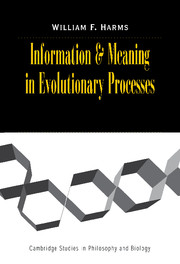Book contents
- Frontmatter
- Contents
- Acknowledgments
- Introduction
- PART I GENERALIZING EVOLUTIONARY THEORY
- 1 Replicator Theories
- 2 Ontologies of Evolution and Cultural Transmission
- PART II MODELING INFORMATION FLOW IN EVOLUTIONARY PROCESSES
- PART III MEANING CONVENTIONS AND NORMATIVITY
- Epilogue: Paley's Watch and Other Stories
- Notes
- Appendix: Proof of Information Gain under Frequency-Independent Discrete Replicator Dynamics for Population of n Types
- References
- Index
2 - Ontologies of Evolution and Cultural Transmission
Published online by Cambridge University Press: 28 July 2009
- Frontmatter
- Contents
- Acknowledgments
- Introduction
- PART I GENERALIZING EVOLUTIONARY THEORY
- 1 Replicator Theories
- 2 Ontologies of Evolution and Cultural Transmission
- PART II MODELING INFORMATION FLOW IN EVOLUTIONARY PROCESSES
- PART III MEANING CONVENTIONS AND NORMATIVITY
- Epilogue: Paley's Watch and Other Stories
- Notes
- Appendix: Proof of Information Gain under Frequency-Independent Discrete Replicator Dynamics for Population of n Types
- References
- Index
Summary
Every voyage of exploration and discovery requires specialized equipment and training. Disciplines that seem unusual may be essential to success. Familiar luxuries must be left behind. The course which seemed straight diverts around unforeseen obstacles, and naive expectations as to what would constitute success give way to what actually can be done. Fortunately for us, our lives do not depend on success of this expedition, but despite the fact that we are venturing forth in our armchairs, at our blackboards and computers, we can still get hopelessly lost if sufficiently unimpressed by the difficulties that lie ahead. It is possible to multiply confusions so that those who come after are faced with the double task of trying to figure out how to understand things and where exactly it was that we went wrong, and why.
Our little expedition is devoted to trying to understand the interdependency between biological and cultural evolution. We follow the map given by evolutionary epistemology, which suggests that there is some common, rigorous way of understanding evolutionary/Darwinian/ selection and variation processes such that the same process occurs on both levels. If the concepts are sufficiently general, then in principle we will be able to extend the analysis to systems with more than two interacting evolutionary processes. Starting in the next chapter, we see that the key to this level of generality lies in concepts of selection and variation which consist simply of a way of organizing causes of change, rather than requiring the discovery of what basic kinds of things evolve.
- Type
- Chapter
- Information
- Information and Meaning in Evolutionary Processes , pp. 52 - 78Publisher: Cambridge University PressPrint publication year: 2004



